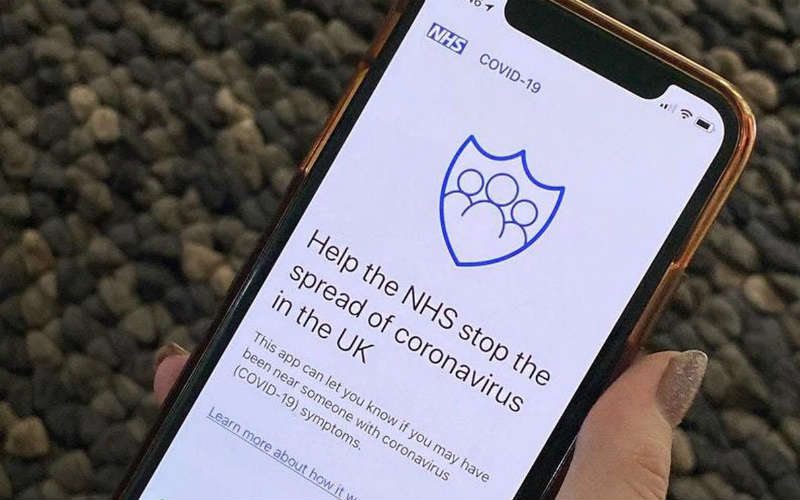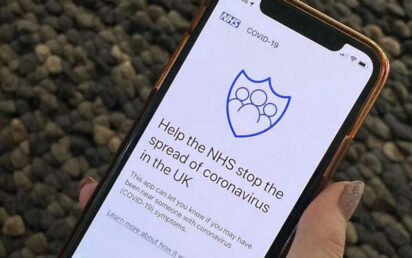The CEO of BLOK BioScience believes blockchain is the answer to privacy concerns over the NHS’ COVID-19 tracing app.
The government decided to have its digital arm NHSX design a tracing app which automatically records location and also allows the feeding of symptom information back to a centralised database. People who may have been in contact with someone displaying potential COVID-19 symptoms can then be alerted and self-isolate.
Countries including Estonia, Germany and Switzerland have instead opted for a decentralised approach, as advocated by Apple and Google, which does not record location data and automatically alerts users about potential contact with COVID-19, without the authorities becoming involved.
Both tools use Bluetooth technology to identify when someone comes within six feet of a person displaying symptoms.
The NHS app is currently being trialled on the Isle of Wight, with a UK-wide rollout expected in the coming weeks.
Jake Moore, a cybersecurity specialist at ESET, explains: “Contact tracing was offered to the government in two very different ways – centralised and decentralised. Centralised tracing comes with concerns around security and safety, and could be the start of another Cambridge Analytica-esque scandal.
“Having a third-party private company with shareholders analyse the data could potentially pose not only a security problem but also another data handling issue. We mustn’t become complacent around the security of our private data, as once we lose it, there is the chance of it being abused in the future.”
London-based BLOK BioScience uses rapid antibody testing and recording to enable government and industry to manage viral outbreaks and mitigate the economic and social effects of epidemics.
It says its solution, which includes a digital tracking platform called My Immunity Passport, allows for both population-level testing and immunity tracking within GDPR and data protection rules.
For example, it can help identify geographical areas that have a strong COVID-19 immune population – and conversely also identify those which do not have strong immunity and will likely need extra support from the health system. The need to classify areas in this way is key to the government’s argument for a centralised app.
And as the UK considers how to ease lockdown and restart its industries – potentially via the use of ‘immunity passports’ – the firm believes blockchain could be the answer.
“While it is encouraging to see that the government is moving on with its trial for the NHS tracing app on the Isle of Wight next week, there will still be questions around its use and the data it collects, despite what the government has promised,” said CEO Alex Tai.
“When we move onto immunity passports, this debate becomes even more important. However, these fears can be addressed by creating passports that act as a self-sovereign record of an individual’s symptoms and test results, which is fully owned by the user and never leaves their possession or is accessed by a third party.
“Distributed ledger technology, or blockchain, is a key enabler for this solution in a number of areas, be it validating the self-sovereign data on a user’s phone, making it much harder to hack or providing traceable, auditable, immutable, and anonymised record of test results and observations.”
Tai also called for greater inclusion in the government’s approach to COVID-19 tracing.
“Let us not forget the most vulnerable,” he added. “While over 70% of the UK population have access to smartphones, some of the people most vulnerable to COVID-19 are also the least likely to have a mobile device – the elderly.
“Any solution must fully work for the whole population, not just the privileged majority.”
Emmanuel Schalit, CEO of password manager and digital wallet app Dashlane, warned that careful consideration needs to be made to the design of any app if it is going to be downloaded by a large proportion of the population.
“The main obstacle to successful contact tracing is that it hasn’t answered the question that any user-friendly product answers: What can it do for the individual?
“Sure, some people might sign up because it makes them feel good to contribute to the health of the community. But it will be a huge challenge to persuade enough people to get involved.
“The only way contact tracing will function at all will be if there is a value to each individual so overwhelmingly obvious that it would outweigh their concerns over privacy – and more realistically, get them to consider participating at all.
“I suspect scaling down and individualising the user story will be a big part of it. It is hard to convince a person to care about theoretical people represented only by concepts or numbers, but it is easier to remind a person that they care about their friends and neighbours.”


